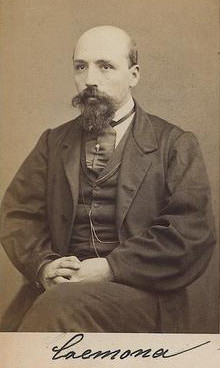Luigi Cremona
| Luigi Cremona | |
|---|---|
 |
|
| Born |
7 December 1830 Pavia, Lombardy, Kingdom of Lombardy-Venetia, Austrian Empire |
| Died | 10 June 1903 (aged 72) Rome, Kingdom of Italy |
| Nationality | Italian |
| Fields | Mathematics |
| Institutions | University of Rome |
| Alma mater | University of Pavia |
| Doctoral advisor | Francesco Brioschi |
| Doctoral students | Giuseppe Veronese |
| Known for | Algebraic curve |
Antonio Luigi Gaudenzio Giuseppe Cremona (7 December 1830 – 10 June 1903) was an Italian mathematician. His life was devoted to the study of geometry and reforming advanced mathematical teaching in Italy. His reputation mainly rests on his Introduzione ad una teoria geometrica delle curve piane. He notably enriched our knowledge of algebraic curves and algebraic surfaces.
Luigi Cremona was born in Pavia (Lombardy), then part of the Austrian-controlled Kingdom of Lombardy-Venetia. His youngest brother was the painter Tranquillo Cremona.
In 1848, when Milan and Venice rose against Austria, Cremona, then only seventeen, joined the ranks of the Italian volunteers. He remained with them, fighting on behalf of his country's freedom, until, in 1849, the capitulation of Venice put an end to the campaign.
He then returned to Pavia, where he pursued his studies at the university under Francesco Brioschi, and determined to seek a career as teacher of mathematics. He graduated in 1853 as dottore negli studi di ingegnere civile e architetto.
Cremona is noted for the important role he played in bringing about the great geometrical advances in Italy. While at the beginning of the nineteenth century Italy had very little mathematical standing, largely influence by his work, the end of the century found Italy in the lead along geometric lines. He was very influential in bringing about reforms in the secondary schools of Italy and became a leader in questions of mathematical pedagogy as well as in those relating to the advancement of knowledge. The mathematical advances which Italy made since the middle of the nineteenth century were largely guided by Cremona, Brioschi, and Beltrami.
...
Wikipedia
